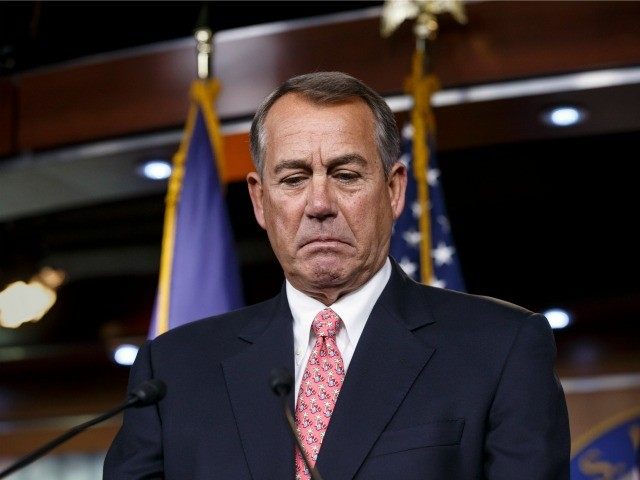Conservatives have grown used to being a minority in Washington, irrespective of which party controls the White House and Congress. But on Tuesday, January 6, a group of just 29 conservatives will have perhaps its only opportunity to change the course of history and drive the direction of the country.
It would only require 29 House members to depose current Speaker John Boehner. With this leverage, conservatives could negotiate significant reforms from a successor who emerges on a second or third ballot, thereby restoring the mandate given to them by the electorate on November 4.
Tuesday will be a profound time for choosing, and given the way Obama has ostensibly overturned the results of the midterm elections, the Speaker’s election could prove more impactful than the votes cast at the ballot box.
We are not living through ordinary times; we are experiencing a constitutional crisis – one in which the sitting president has threatened to remake our immigration system and other fundamental laws, traditions, and values through executive fiat.
Yet, at the same time, the leader of the Republican-controlled House has admitted to giving the president the green light to implement executive amnesty. More broadly, he has demonstrated time and again that he will pass votes with Democrat support and whip votes together with Obama to avoid fighting the president on the fundamental issues of our time.
At this critical juncture, the few dozen conservatives in the House have two options.
They can allow themselves and the 2014 electorate to remain disenfranchised, helplessly standing by while Boehner passes crucial legislation on amnesty, budget bills, Obamacare, and debt ceiling increases with Democrat support. Or they can seize control of their own destiny by using the first vote of this Congress – the only vote for which Boehner cannot rely on Democrat support – to veto the Speaker himself and preempt a disastrous two years of lawmaking.
Despite misinformation some Republican members and incoming freshmen have given constituents, the selection of John Boehner for Speaker, unlike the election of the other party leaders, has not been cemented. And in fact, on Tuesday, if every Republican who claims to be frustrated and even appalled by Boehner’s behavior would vote for any other name, they can deny him reelection as Speaker.
Unlike last month’s vote, which served to nominate Boehner in conference as the GOP pick for Speaker, the vote on the floor of the House will not be a voice vote by acclimation, nor will it be a secret ballot. Each of the 435 members is called to stand before a packed chamber and the millions of viewers on television to proclaim a choice for Speaker. No member is bound to vote for the nominee of his party; each member is free to vote for any individual qualified to serve as Speaker. Indeed, on 17 occasions since 1913, individual members have registered votes for “third choices.”
A group of 17 progressive Republicans orchestrated a similar stratagem in 1923, whereby they blocked the party’s nominee from securing a majority for nine consecutive ballots until the party leadership agreed to implement some of the reforms they were suggesting. Certainly the seriousness of our current constitutional and political crisis warrants an effort like this from a group of bold conservatives in order to secure a reasonable compromise with a new Speaker, even if the choices that emerge are from the establishment wing of the party.
The operative point here is that it is not sufficient to garner a plurality of the votes; the winner must secure a majority of the total number of votes cast. Consequently, given that there are 247 Republican members in the new Congress, if 29 members vote for someone other than Boehner – be it Rep. Jim Jordan, their favorite colleague, or even a private citizen – Boehner would be denied the majority of likely votes cast.
To be clear, there is zero chance of Pelosi becoming Speaker because she would never win more than 188 votes, far short of the majority of the House body.
Some members are equivocating over the vote because there is no clear alternative willing to challenge Boehner. Other recalcitrant and risk-averse conservatives are conjuring up all sorts of excuses to avoid confrontation with Boehner on the House floor. But nobody will challenge party leadership until the vulnerability or vacancy is created. By joining together and organizing a move to deny Boehner the majority, these 29 conservatives can create such an opportunity. This would force a second or third ballot and Republicans would have to reconvene a conference. They would finally be compelled to negotiate with conservatives who would only agree to give their votes for someone who commits to certain fundamental principles and ironclad concessions.
Although this is arguably not a perfect plan, as these members stand before their constituents and gratuitously utter the words “John Boehner,” they will have sealed their own fate for the next two years because they have offered no alternative plan to reestablish a modicum of conservative control over the conservative party. Those self-described conservatives who are reluctant to join this effort have an obligation to put forth other ideas for reestablishing a voice within the party.
On Tuesday, choose wisely and fear no man.

COMMENTS
Please let us know if you're having issues with commenting.